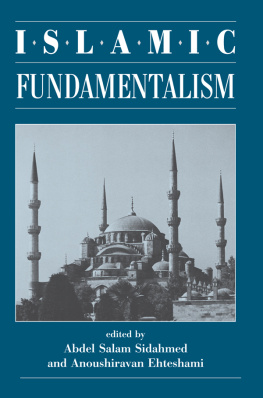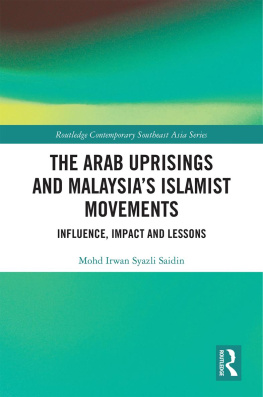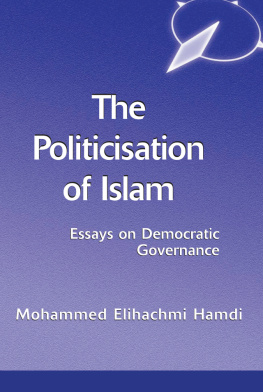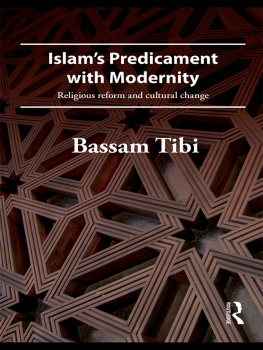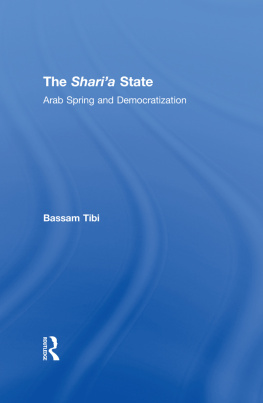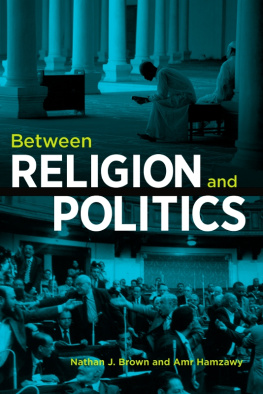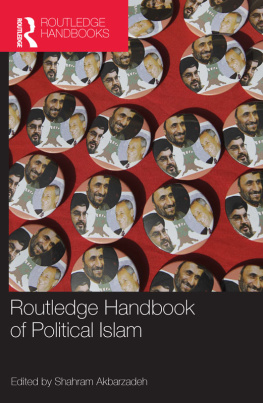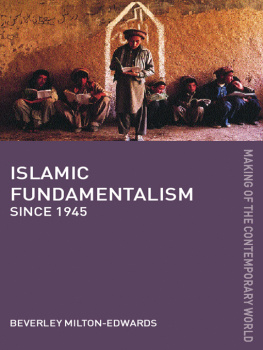Islamic Fundamentalism
First published 1996 by Westview Press
Published 2018 by Routledge
711 Third Avenue, New York, NY 10017, USA
2 Park Square, Milton Park, Abingdon, Oxon OX14 4RN
Routledge is an imprint of the Taylor & Francis Group, an informa business
Copyright 1996 Taylor & Francis
All rights reserved. No part of this book may be reprinted or reproduced or utilised in any form or by any electronic, mechanical, or other means, now known or hereafter invented, including photocopying and recording, or in any information storage or retrieval system, without permission in writing from the publishers.
Notice:
Product or corporate names may be trademarks or registered trademarks, and are used only for identification and explanation without intent to infringe.
Library of Congress Cataloging-in-Publication Data
Islamic fundamentalism / edited by Abdel Salam Sidahmed and
Anoushiravan Ehteshami.
p. cm.
Includes bibliographical references and index.
ISBN 0-8133-2429-7.ISBN 0-8133-2430-0 (pbk.)
1. Islam and politics. 2. Islamic countriesPolitics and
government. I. Sidahmed, Abdel Salam. II. Ehteshami,
Anoushiravan.
BP60.I821996
322.10917671dc20
96-16463
CIP
ISBN 13: 978-0-8133-2430-2 (pbk)
Contents
, Abdel Salam Sidahmed and Anoushiravan Ehteshami
, Youssef Choueiri
, Suha Taji-Farouki
, Charles Tripp
David George
, Claire Spencer
, Maha Azzam
, Beverley Milton-Edwards
, Anoushiravan Ehteshami
, Iyad Barghouti
, Abdel Salam Sidahmed
, Raymond A. Hinnebusch
, Eric Watkins
, Mehdi Mozaffari
, Muhammad Mahmoud
Guide
Political Islam has emerged as a potent force in the Middle East and North Africa, dominating the political and social map of the region. Engaged in an increasingly open struggle for power with the ruling elites in the Arab world, the Islamists have become the main source of political instability in many Arab states. Political developments in the Middle East and North Africa since the late 1970s show that the fundamentalist phenomenon is neither a single movement nor the same force in all corners of the region.
This book offers an in-depth, timely analysis of the rise of Islamic fundamentalism and other Islamic movements in the contemporary Middle East and North Africa. In original and specially commissioned essays, the contributors examine important differences between the movements and discuss the dissimilar circumstances in which they have emerged, offering new perspectives on their role in the region and prospects for the future. Through detailed case studies, our international team of authors traces the various manifestations of the fundamentalist phenomenon and its implications for the divergent nations of the Muslim world and beyond. They map out the power, influence, and presence of the movements in the emerging post-Cold War order and initiate a new dialogue with due appreciation for the current realities and the coming winds of change.
We hope that the interdisciplinary nature of this study will provide specialists, observers of the region, and policymakers with unique insights into the state of Islamist movements and states of the Middle East and North Africa. The book is divided into three parts. The first part, comprising four chapters, tackles issues of a thematic nature, such as Islamic state theories, the paradigm of Islamist movements, and Islamist attitudes about international relations. Youssef Choueiris discussion of the political discourse of the Islamist movements is complemented by Suha Taji-Faroukis examination of the intellectual and practical problems the Islamists have faced when formulating for government. Charles Tripps panoramic survey of Islamist movements in action provides evidence for the view that the secular aspects of the structures of power in Middle Eastern states tend to shape Islamic political activity, a conclusion that forms the heart of David Georges contribution to this book. George develops the view that the Islamists main predicament is how to counter the existing international order and replace it with pax Islamica.
The second and third parts of the book are based on empirical observations of the Islamists in their domestic, natural habitats. The reader is taken on a journey of discovery, from Algeria (Claire Spencer), Tunisia (Muhammad Mahmoud), Sudan (Abdel Salam Sidahmed), and Egypt (Maha Azzam) in North Africa to Syria (Raymond A. Hinnebusch), Jordan (Beverley Milton-Edwards), and Palestine and Israel (Iyad Barghouti) in the Mashreq. One of the highlights is Mahmouds focus on one of the most controversial themes in contemporary Islamist discoursewomens issuesthrough a detailed analysis of Rashid al-Ghannushis writings on the subject.
In addition, in his chapter on Yemen, Eric Watkins traces the rise of Islamism in united Yemen and its place in the countrys post-civil war political order. The successes and failures of non-Arab Iran, the regions first revolutionary Islamic state, are closely scrutinized by Anoushiravan Ehteshami. Mehdi Mozaffaris research provides insights into the differences between the 1979 revolution in Iran and the explosive situation in Algeria, complementing the findings of Ehteshami in the case of Iran and Spencers observations on Algeria.
Finally, we hope that the readers lasting impression of this book will be that Islamic fundamentalism is not a single monolith but is still a dynamic political force. These movements are, by definition, political and as such are subject to the secular rules of playing for power. It should become clear that, where in power, the Islamists no longer uphold the ideological purities that they appeared to be fighting for. Many contributors to this book illustrate that Islamist leaders have increasingly realized that power, though sweet, demands responsibility if it is not to turn sour. With responsibility comes cost-benefit analysis and the need to temper and balance utopian expectations of the zealous with the requirements of the state.
Abdel Salam Sidahmed
Anoushiravan Ehteshami
This book does not follow particular transliteration systems for Arabic and Persian words. Diacritical marks have been kept to a minimum, except for the Arabic ayn (). Most transliterated words are italicized at every appearance. Proper nouns, however, including names of sects and organizations, are capitalized but not italicized. Where Jamaa and Jihad are capitalized, they indicate names of organizations.
Throughout the text we have used the terms Islamist(s) and Islamism, rather than Islamic or Islamicist, to denote the movements of political Islam and its activists.
The list that follows includes only the most common Arabic and Persian words used in the book, that is, those that appear in more than one chapter or are used as key terms in one chapter. Pers. indicates Persian words; all others are Arabic.
Terms and Phrases
| adaivat | tools, procedures (synonymous with asalib; see uslub ) |
| ahadith | sayings and tradition of Prophet Muhammad; sing, hadith |
| ahd | covenant |
| ahdath | events |
| ahl | people |
| ahl alhall walaqd | those who resolve public matters |
| akhondism (Pers.) | ecclesiastical |
| alim |

